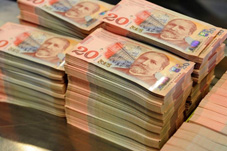NBG increases refinancing rate by 0.5 %
By Natalia Kochiashvili
Thursday, December 12


The NBG linked the decision to sharply rising inflation expectations, as annual inflation reached 7% in November. According to the statement, in addition to the single factors, the nominal effective exchange rate depreciation has a significant impact on inflation and starting from September the NBG has begun tightening policies aimed at neutralizing the inflationary impact of the exchange rate depreciation.
“Despite the recent strengthening of GEL, the exchange rate remains unchanged, which helps to expect higher than target inflation. In order to maintain inflation close to the target over the medium term, policy tightening will continue until the impact of the exchange rate on inflation is eliminated,” NBG stated.
According to the same forecast, inflation is expected to start lowering from March next year and get close to the target by the end of the year. Further decisions by the Monetary Policy Committee will depend on how quickly the inflationary pressure on the exchange rate will decrease.
The NBG notes that the growth rate of exports and remittances remains moderate. It is noteworthy that after the decrease in the previous months, in October-November there was an annual increase in tourist revenue. In addition, foreign direct investment inflows increased in the third quarter. Against the background of the aforementioned external dynamics and sustainable lending, preliminary data indicate quite high economic activity.
"The NBG will continue to monitor current economic processes and financial markets, and will use all means at its disposal to ensure price stability," said the agency.
The increase in refinancing will increase the price of loans tied to the exchange rate in the national currency.
As of November 2019, 111 400 loans with variable interest rates have been issued. The overwhelming majority of them are tied to the refinancing rate. Accordingly, borrowers will have increased their interest rate by 0.5 percent to 9 percent. At present, loans amounting to GEL 5909 million have been issued at variable interest rates. This is stated in the information of “The society and banks”.
According to the organization, the number of loans extended from October 1 to November 1 increased by 4,000 and the total portfolio increased from 5713 million to 5909 million GEL. Out of 111 400 contracts, 30900 are consumer loans with a volume of 745.51 million GEL. The weighted average interest rate on Consumer Loans was 15.88% as of November 1.
As the organization explains, real estate loans are in the first place. As of November, 41600 loans were tied to the refinancing rate, at an average of 10.51%. The total portfolio is GEL 1924.52 million.
There are also 35200 contracts for business loans. The total portfolio is 2995.54 million GEL. Of these, the banks have issued GEL 1035.08 million to finance SMEs, at an average of 14.09%.
Loans tied to variable interest rates amounted to 43.17% of the total credit portfolio in GEL as of November 1. Most of them are business loans, and the lowest interest rates are on mortgages.
According to the organization, as compared to the same period of the previous year, the portfolio of loans with variable interest rates increased by GEL 2606 million, while the interest rates on average decreased from 12.32% to 12%.
According to “The society and banks”, the monetary policy rate hike was expected, as the NBG said it would continue to tighten its monetary policy until inflation pressure was lifted.
